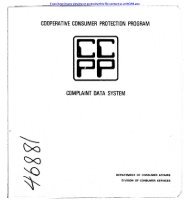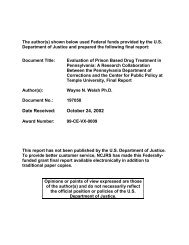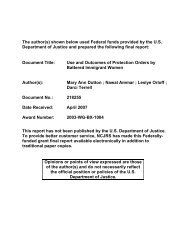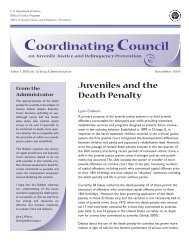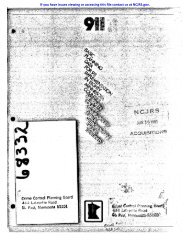Conflict Resolution Education - National Criminal Justice Reference ...
Conflict Resolution Education - National Criminal Justice Reference ...
Conflict Resolution Education - National Criminal Justice Reference ...
You also want an ePaper? Increase the reach of your titles
YUMPU automatically turns print PDFs into web optimized ePapers that Google loves.
Social Competence<br />
♦ Responsiveness to others.<br />
♦ Conceptual and intellectual<br />
flexibility.<br />
♦ Caring for others.<br />
♦ Good communication skills.<br />
♦ Sense of humor.<br />
bonding—the feeling of being connected to others—<br />
as the overarching protective factor in the development<br />
of healthy behavior. Early in life, resilient<br />
children often establish positive adult and peer relationships<br />
that bond them to family, school, and<br />
community. Hawkins and colleagues outline three<br />
protective processes necessary for the development of<br />
strong bonds: opportunities, skills, and recognition. 22<br />
♦ Opportunities. Children must have the opportunity<br />
to contribute to their family, school, and<br />
community. The goal is to provide children with<br />
meaningful, challenging, developmentally appropriate<br />
opportunities that help them feel responsible<br />
and significant. Research shows that<br />
bonding to school occurs when instructional methods<br />
emphasize proactive classroom management,<br />
interactive teaching, and cooperative learning.<br />
♦ Skills. Students need opportunities to learn the<br />
cognitive and social skills that are necessary to<br />
solve problems and interact with others. If they<br />
lack the appropriate skills, children will experience<br />
frustration and failure and their opportunities<br />
to bond will be limited.<br />
♦ Recognition. Children feel potent and powerful<br />
when their contributions are valued by their peers,<br />
Table 3: Characteristics of Resilient Children<br />
Problem-Solving Skills<br />
♦ Ability to apply abstract<br />
thinking.<br />
♦ Ability to engage in reflective<br />
thought.<br />
♦ Critical reasoning skills.<br />
♦ Ability to develop alternative<br />
solutions in frustrating<br />
situations.<br />
73<br />
Sense of Autonomy<br />
♦ Positive sense of independence.<br />
♦ Emerging feelings of efficacy.<br />
♦ High self-esteem.<br />
♦ Impulse control.<br />
♦ Planning and goal setting.<br />
♦ Belief in the future.<br />
Source: Benard, B. 1993 (November). “Fostering Resiliency in Kids.” <strong>Education</strong>al Leadership, pp. 44–48. Reprinted with<br />
permission of the Association for Supervision and Curriculum Development.<br />
teachers, and families. Children must be recognized<br />
for their capabilities and for their participation.<br />
The Relation Between Resilience and<br />
<strong>Conflict</strong> <strong>Resolution</strong><br />
The relation between resilience and conflict resolution<br />
is clear and significant. The characteristics of<br />
resilience listed in table 3 are essentially the same<br />
as the foundation abilities of conflict resolution<br />
(orientation, perception, emotion, communication,<br />
and creative and critical thinking). 23 In developing a<br />
conflict resolution education program, a school creates<br />
an environment that fosters the development of<br />
resilience in children in three ways. First, resolving<br />
conflicts in principled ways promotes and preserves<br />
relationships, thereby facilitating the bonding that<br />
is essential to the development of resilience. Second,<br />
conflict resolution education develops resilience by<br />
showing youth that they can control their behavior<br />
by making choices that satisfy their needs. Finally,<br />
in offering youth the opportunity to resolve conflicts<br />
peacefully, conflict resolution education sends an<br />
empowering message of trust and perceived capability<br />
in which the characteristics of resilience<br />
can thrive.



